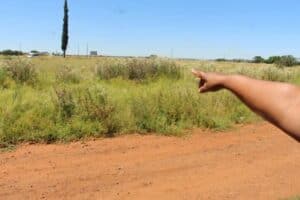Ian Gabriel's riveting drama Four Corners could have been culled from the pages of today's newspaper headlines, as it plunges into the very heart of the violence-driven Cape Flats.

It is one of the best productions of its kind I’ve seen in a long time, with mesmerising performances and a storyline that is believable and utterly compelling. Its theme is a universal one, yet Gabriel and his team have cleverly broadened the scope to embrace gang warfare, emphasising how decisions can have reverberating effect on your life.
Four Corners – from “Die vier hoeke”, South African prison slang for the world within the four corners of a prison cell – is a work that shines on several levels and draws viewers into the world of gangsters, crime and a unique and volatile sub-culture of South African life.
It is sometimes raw and horribly violent in its telling, yet there are tender moments and typical Cape humour as director Gabriel spreads his canvas.
Farakahn, chillingly portrayed by Brendon Daniels, is released after serving 13 years in one of South Africa’s toughest maximum security prisons, Pollsmoor. Farajahn is a tough, bitter man who is the general in the notorious Numbers Gang.
Once free from prison, he is intent on reassessing his life and finding some peace, but is painfully reminded each day of the life he so desperately wants to leave behind. He knows he has a 13-year-old son whom he has never met and his main focus is finding the young man.
The violence and murders involving the gangs have escalated at an alarming rate. Ruthless outfits with names such as Americans, Nice Times, Mongrels and Dixie Boys control the ghetto streets, where crack and guns are sold openly. There is also a serial killer on the loose who is targeting young boys.
Add to this fiery cocktail an equally important element: the story of Ricardo (an excellent debut by Jezriel Skei), a studious young man with a penchant for chess and an aversion to the gangs around him. Gasant (Irshaad Ally), the charismatic leader of the Americans, tries to entice Ricardo to join them. Ricardo is reluctant at first, but there is prestige attached to the role.
Lindiwe Matshikiza plays Leila Domingo, a London-trained doctor who returns home for her estranged father’s funeral and becomes embroiled in the politics of the Cape Flats, especially when she meets Farakahn, recognises him as the boy who lived next door and is slowly drawn into his sordid world. Abdurahman Adams plays Captain Tito Hanekom, a career cop hellbent on tracking down the serial killer, who takes the impressionable Ricardo under his wing.
Ian Gabriel’s second film, written by Hofmeyr Scholtz and Terence Hammond, is a neatly structured, well-crafted exercise that highlights the shifting concepts of family, fatherhood and gangs. At its core is the coming of age of a young boy in the toughest of circumstances and audiences, no matter their own backgrounds, will surely resonate with this engaging character.
It’s interesting to note that this is the first film to be told in a blend of Sabela (the secret language of the Number Gangs), Tsotsi taal, Cape Afrikaans and English.
Support Local Journalism
Add The Citizen as a Preferred Source on Google and follow us on Google News to see more of our trusted reporting in Google News and Top Stories.









